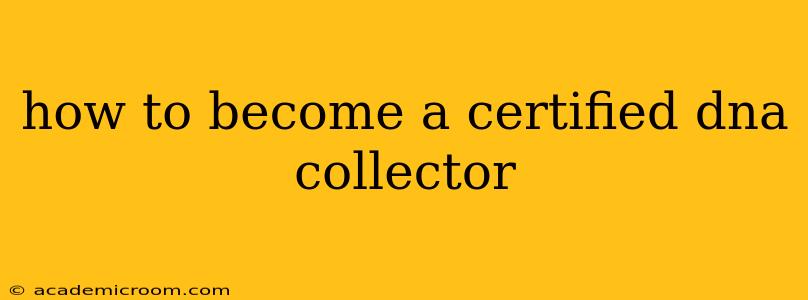The field of DNA collection is rapidly expanding, driven by advancements in forensic science, genetic genealogy, and medical research. Becoming a certified DNA collector requires a combination of education, training, and adherence to strict protocols. This comprehensive guide outlines the necessary steps to pursue this career path. While there isn't a single, universally recognized "certified DNA collector" title, the path involves becoming proficient in specific areas and demonstrating competency through training and experience.
What Does a DNA Collector Do?
Before diving into the how-to, let's clarify what DNA collectors do. They are responsible for the meticulous collection and preservation of DNA samples, ensuring their integrity for subsequent analysis. This involves following rigorous procedures to avoid contamination and maintain the chain of custody, crucial for legal and scientific validity. Different settings demand varying levels of expertise and training. For instance, a DNA collector in a forensic lab will require a significantly different skill set and certification than one working in a medical setting.
Educational Requirements and Training
The educational pathway to becoming a proficient DNA collector typically involves a strong foundation in biology, genetics, or a related scientific field. A bachelor's degree is often a minimum requirement, while a master's degree can enhance career prospects, especially in specialized areas like forensic science.
Many reputable organizations and institutions offer specialized training programs in DNA collection techniques, focusing on:
- Proper sample collection methods: This includes buccal swabs (cheek cells), blood samples, hair follicles, and other biological materials. Each sample type requires specific procedures.
- Chain of custody procedures: Maintaining a detailed and unbroken chain of custody is paramount to ensure the admissibility of evidence in legal settings. This involves meticulously documenting every step of the collection and handling process.
- Sample labeling and storage: Accurate labeling and proper storage are critical to preventing degradation and contamination.
- Quality control and quality assurance: This is vital to ensuring the reliability and accuracy of the collected samples.
- Understanding of legal and ethical considerations: DNA collection involves sensitive personal information, requiring adherence to strict ethical and legal guidelines regarding privacy and informed consent.
Specific Training Options:
While there is no single "DNA Collector Certification," seeking training through institutions specializing in forensic science or relevant medical fields is crucial. Look for programs accredited by recognized bodies in your region. These programs often incorporate hands-on training and practical exercises.
Experience and Job Opportunities
Gaining practical experience is equally important. Entry-level positions might include working as a laboratory assistant or technician under the supervision of experienced professionals. This allows you to hone your skills and learn best practices. Networking within the field is also valuable, attending conferences and workshops to build connections.
Job opportunities exist in various settings, including:
- Forensic science laboratories: Working with law enforcement agencies on criminal investigations.
- Medical research institutions: Contributing to genetic research and clinical trials.
- Private genetic testing companies: Processing samples for ancestry testing and other genetic services.
- Hospitals and healthcare facilities: Collecting samples for paternity tests, disease diagnosis, and other medical purposes.
What are the legal and ethical considerations?
H2: What legal and ethical considerations should I be aware of when collecting DNA samples?
Collecting DNA samples requires strict adherence to legal and ethical guidelines. You must obtain informed consent from the individual providing the sample, clearly explaining the purpose of the collection, how the data will be used, and who will have access to it. Confidentiality and data privacy are paramount. Any breach of these guidelines can have serious legal repercussions. Familiarize yourself with relevant laws and regulations in your jurisdiction, including HIPAA (in the US) and GDPR (in Europe).
H2: What are the potential risks of improper DNA collection?
Improper DNA collection techniques can lead to sample contamination, degradation, and inaccurate results. This could compromise the integrity of forensic investigations, medical diagnoses, or genetic research. Maintaining a meticulous chain of custody is vital to prevent any disputes over the authenticity and integrity of the sample. Contamination can lead to inconclusive or erroneous results, potentially resulting in miscarriages of justice or incorrect medical treatments.
H2: What certifications or licenses are required for DNA collection?
There's no single universal "DNA Collector Certification." However, depending on your specific role and location, various certifications and licenses might be beneficial, such as those related to forensic science, medical laboratory technology, or clinical research. Check with the relevant regulatory bodies in your area for specific requirements. Moreover, employers might have their own internal training and certification programs.
This guide provides a comprehensive overview of the path to becoming a proficient DNA collector. Remember that consistent professional development, ethical conduct, and attention to detail are essential for success in this demanding yet rewarding field. Always prioritize the accuracy and integrity of your work.
